Charles M. Kozierok The TCP-IP Guide
Подождите немного. Документ загружается.

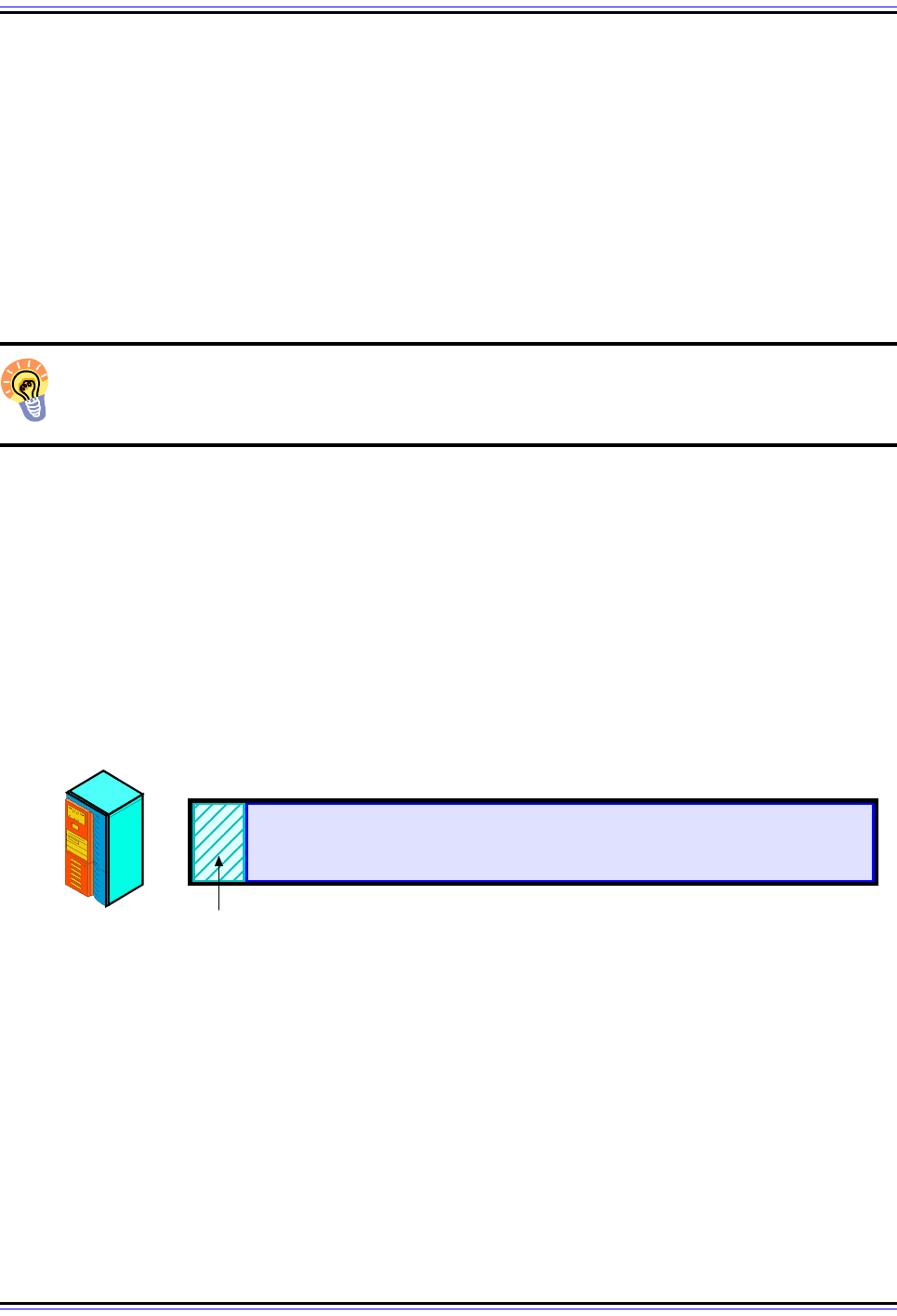
The TCP/IP Guide - Version 3.0 (Contents) ` 1141 _ © 2001-2005 Charles M. Kozierok. All Rights Reserved.
Of course, many clients will request addresses from this pool. Most of these clients are
“equals” as far as the DHCP server is concerned, and it doesn't matter which address each
individual client gets. This means most of the information stored with each of the addresses
in a pool may be the same except for the address number itself. Due to this similarity, it
would be inefficient to have to specify each address and its parameters individually. Instead,
a range of addresses is normally handled as a single group defined for a particular network
or subnet. These are not given any particular name in the DHCP standards, but are
commonly called scopes. This term has been popularized by Microsoft in its DHCP server
implementations. Other operating systems sometimes just call these blocks of addresses
ranges, but I prefer “scope” so that is what I am using here.
Key Concept: Each DHCP server maintains a set of IP addresses that it uses to
allocate leases to clients. These are usually contiguous blocks of addresses
assigned to the server by an administrator, called DHCP address ranges or scopes.
Simple Address Assignment For a Single Scope
The exact method for setting up scopes depends on the particular operating system and
DHCP server software, and I am not going to get into that here. However, each scope
definition typically begins by specifying a range of addresses using a starting and an ending
IP address. For example, if a company was assigned the IP address block 111.14.56.0/24,
the administrator might set up a scope encompassing addresses 111.14.56.20 through
111.14.56.254, as shown in Figure 260. Then for that scope, the administrator can set up
various parameters to be specified to each client assigned an address from the scope.
Why not start at 111.14.56.1? Usually we will want to set aside certain IP addresses for
manual configuration of servers, routers and other devices requiring a fixed address. One
easy way to do that is to simply reserve a block of addresses that aren't used by DHCP.
Alternately, most DHCP server software will allow you to specify a range but exclude an
address or set of addresses from the range. So we could specify 111.14.56.1 through
111.14.56.254 and individually mark as “not available” addresses we manually assign. Or
specify that 111.14.56.1 through 111.14.56.19 are reserved.
Figure 260: DHCP Scope
DHCP Scope
(111.14.56.20 - 111.14.56.254)
Address Block 111.14.56.1 - 111.14.56.254
Reserved Range
(111.14.56.1 -
111.14.56.19)
DHCP
Server
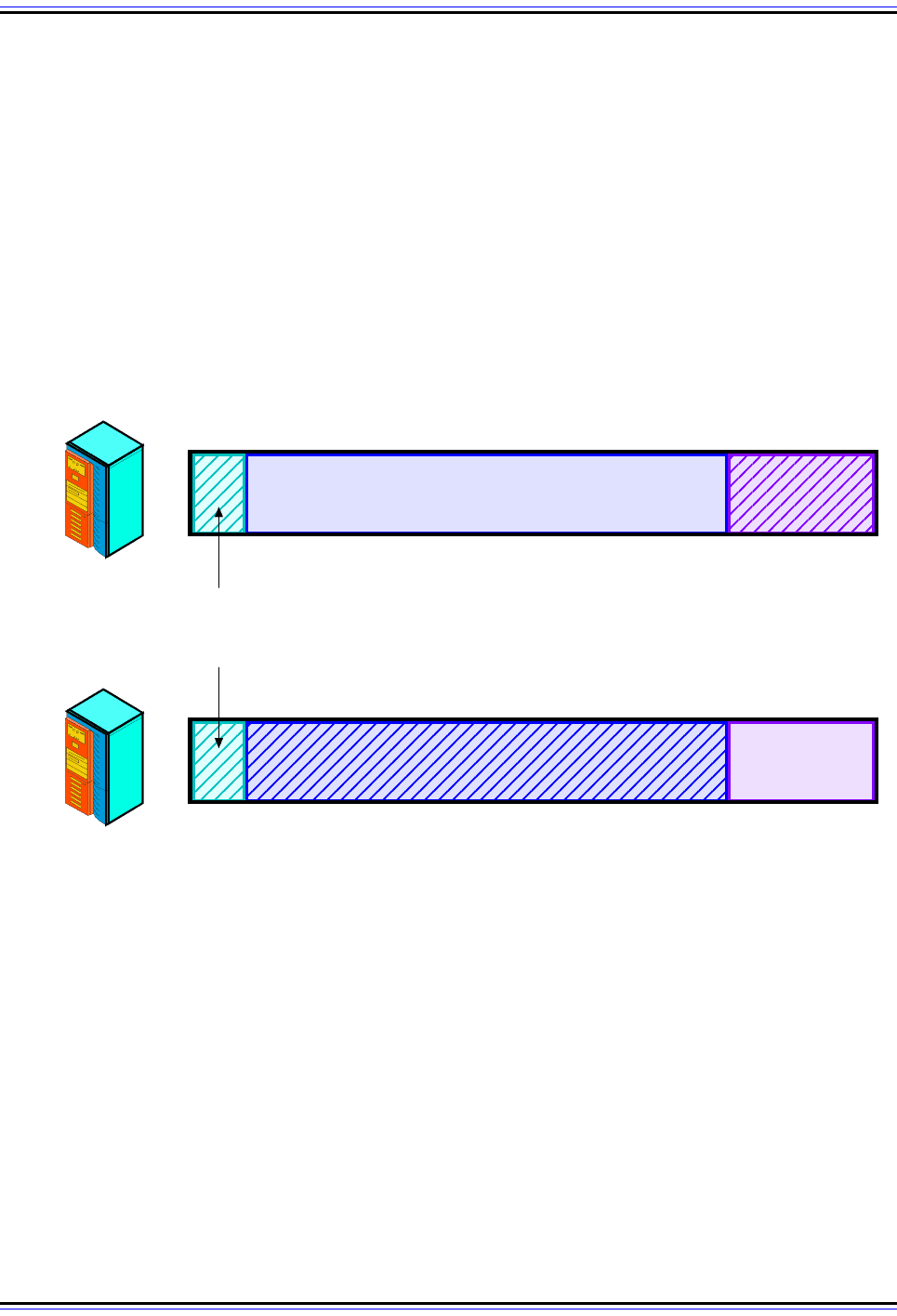
The TCP/IP Guide - Version 3.0 (Contents) ` 1142 _ © 2001-2005 Charles M. Kozierok. All Rights Reserved.
Address Assignment With Multiple Scopes
Instead of putting all of its addresses (except excluded ones) in a single scope, a server
may use multiple scopes. One common reason for the latter approach is to support more
than one subnet on a server. Multiple scopes are also commonly used when multiple DHCP
servers are used to serve the same clients. There are two ways to do this: either by having
overlapping or non-overlapping scopes.
Overlapping scopes allows each server to assign any address from the same pool.
However, the DHCP standard doesn't specify any way for servers to communicate with
each other when they assign an address, so if both servers were told they could assign
addresses from the same address pool, this could result in both servers trying to assign a
particular address to two different devices.
As a result, if you are using two DHCP servers (as is often recommended for redundancy
reasons), the administrator generally gives them different, non-overlapping scope assign-
ments. Alternately, the same scope is given to each server, with each server told to exclude
from use the addresses the other server is assigning.
For example, suppose we have two DHCP servers: A (the main server) and B (the backup).
We want to assign most of the addresses to A and a few as backup to B. We could give
both A and B the scope 111.14.56.1 through 111.14.56.254. We’d exclude 111.14.56.1
through 111.14.56.19 from both. Then we'd exclude from server A the range 111.14.56.200
Figure 261: DHCP Multi-Server Non-Overlapping Scopes
DHCP servers A and B have been assigned non-overlapping scopes to ensure that they do not conflict. This
has been done by starting with the same scope definition for both. The common reserved range is excluded
from each. Then, server A has server B’s address range excluded (shaded purple at top) and B has A’s range
excluded (shaded blue, bottom).
Serve r A Scope
(111.14.56.20 - 111.14.56.199)
Server A
Range Excluded -
Assigned to
Serve r B
Range Excluded - Assigned to Server A
Server B
Serve r B Scope
(111.14.56.200 -
111.14.56.254)
Address Block 111.14.56.1 - 111.14.56.254
Reserved Range
(111.14.56.1 -
111.14.56.19)
Address Block 111.14.56.1 - 111.14.56.254
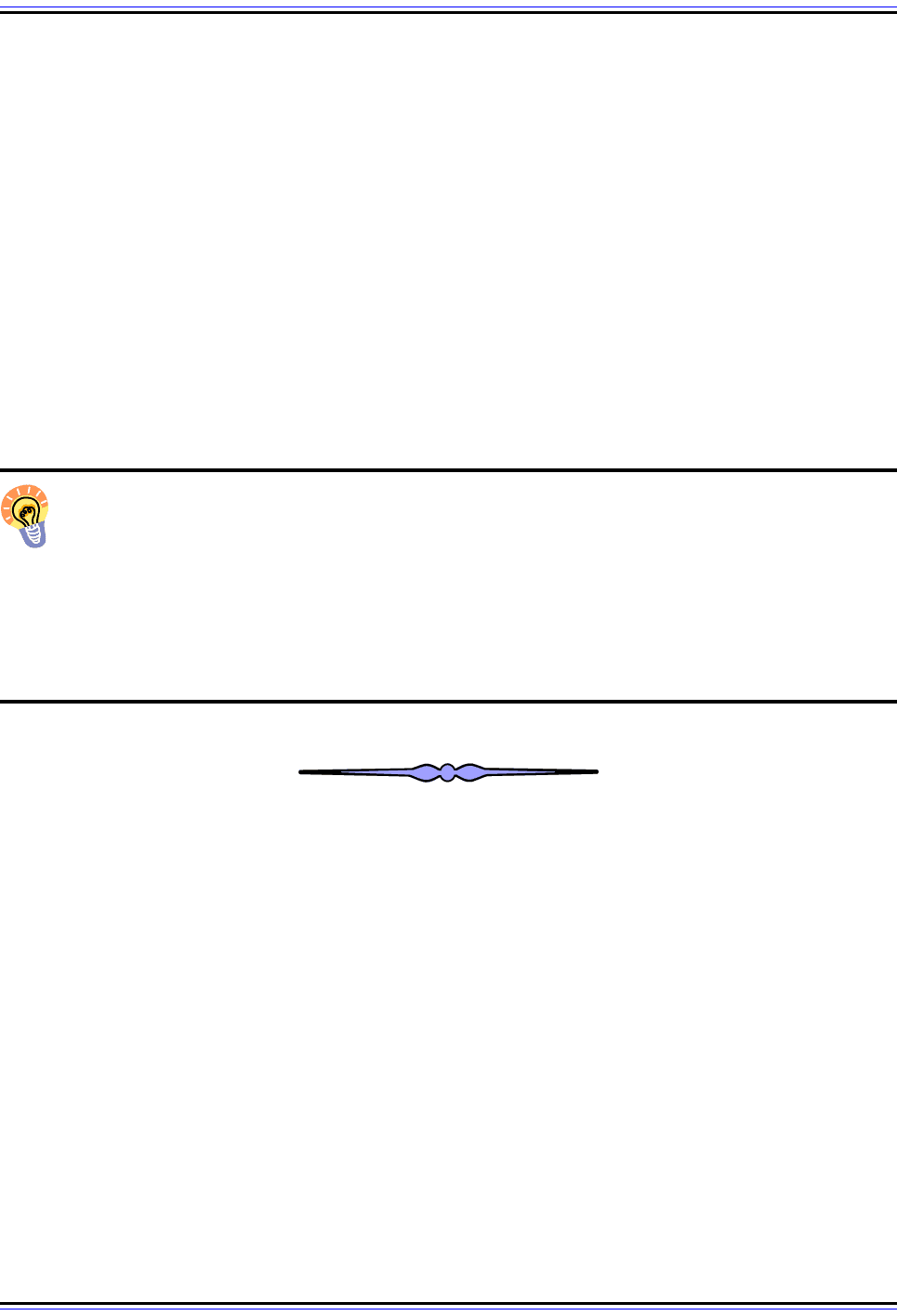
The TCP/IP Guide - Version 3.0 (Contents) ` 1143 _ © 2001-2005 Charles M. Kozierok. All Rights Reserved.
through 111.14.56.254, and exclude from server B the range 111.14.20 through
111.14.56.199. Figure 261 shows how this would work. The main advantage of this method
is that if one server goes down, the administrator can quickly remove the exclusion and let
the remaining server access all addresses. Also, if one server runs out of addresses while
the other has plenty, the allocations can be easily shifted.
Other Issues With Address Management
There are many other issues related to address management, which start to get into the
“guts” of DHCP server implementation. For example, as was the case with BOOTP, we may
need to use relay agents when the DHCP server is responsible for addresses on a subnet
different from its own. There are also special DHCP features that affect how addresses are
managed. For example, the DHCP conflict detection feature can actually allow two servers
to have overlapping scopes, despite what we said above. The section on DHCP implemen-
tation and features gets into these issues in more detail.
Key Concept: If a site has multiple DHCP servers, they can be set up with either
overlapping or non-overlapping scopes. Overlapping scopes allow each server to
assign from the same pool, providing flexibility, but raising the possibility of two
clients being assigned the same address unless a feature such as server conflict detection
is employed. Non-overlapping scopes are “safer” because each server has a dedicated set
of addresses for its use, but this means one server could run out of addresses while the
other still has plenty, and if a server goes down its addresses will be temporarily
unallocatable.
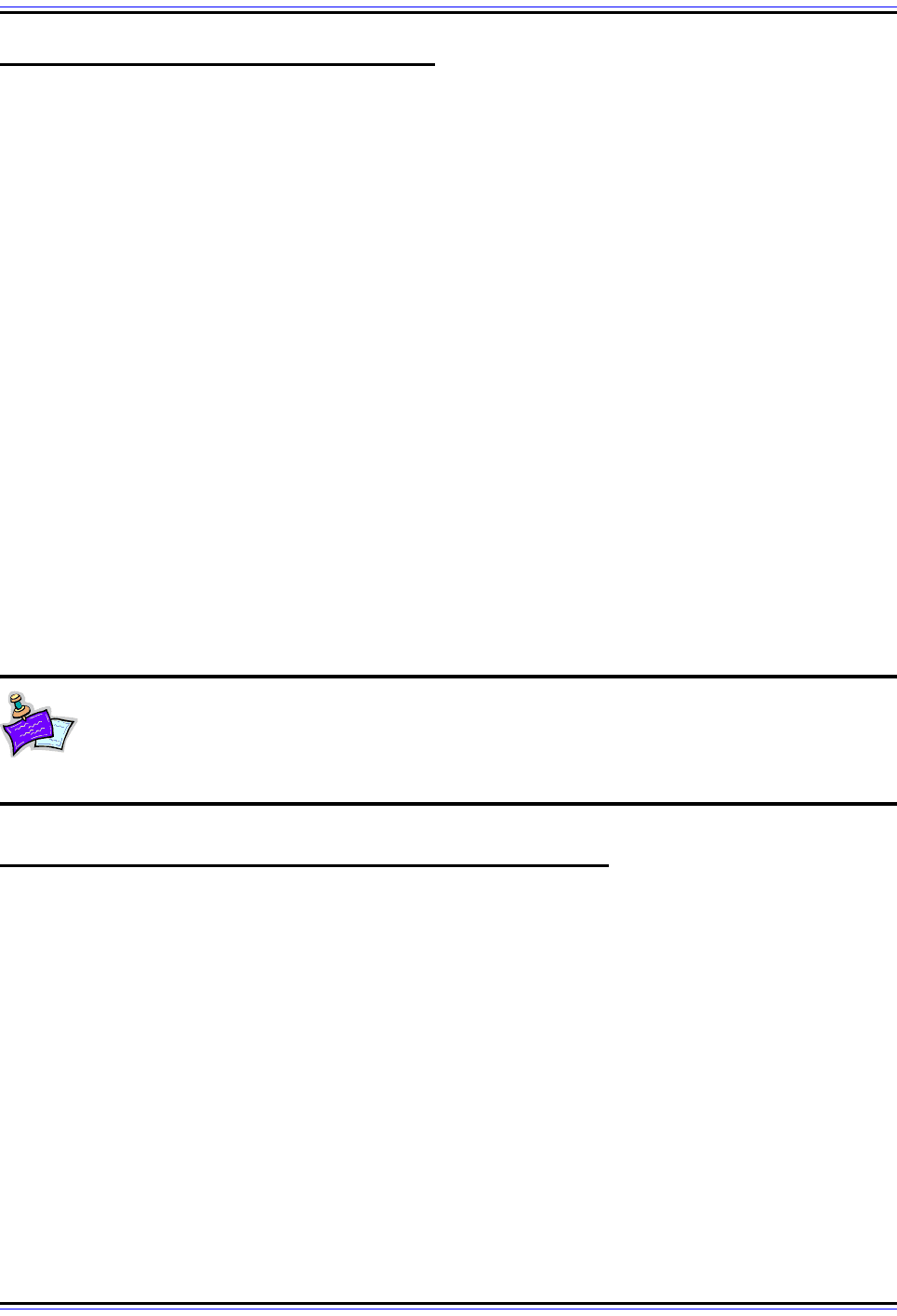
The TCP/IP Guide - Version 3.0 (Contents) ` 1144 _ © 2001-2005 Charles M. Kozierok. All Rights Reserved.
DHCP Configuration and Operation
The “big news” in DHCP is dynamic address allocation, and the concept of address leasing.
It is in fact this new functionality that makes DHCP significantly more complex than its
predecessor. BOOTP is a simple request/reply protocol because a server only needs to
look up a client's hardware address and send back the client's assigned IP address and
other parameters. In contrast, DHCP clients and servers must do much more to carry out
both parameter exchange and the many tasks needed to manage IP address leasing.
In this section I delve into the “nuts and bolts” of how DHCP operates. I begin with two
background topics. The first provides an overview of the responsibilities of clients and
servers in DHCP, and shows in general terms how they relate to each other. The second
discusses DHCP configuration parameters and how they are stored and communicated.
The remaining five topics illustrate the operation of DHCP in detail. The first of the five
describes the DHCP client finite state machine, which will give you a high-level look at the
entire client lease “life cycle”, including address allocation, reallocation, renewal, rebinding
and optionally, lease termination. This theoretical description is then used as the basis for
several topics that explain the actual processes by which DHCP client lease activities occur.
These show the specific actions taken by both client and server and when and how DHCP
messages are created and sent. The last of the five topic describes the special mechanism
by which a device not using DHCP for address allocation can request configuration
parameters.
Note: If you are going to read this section, I strongly recommend reading the first
three topics in sequence. Then, if you plan to read any of the following four
“Process” topics, start with the first one on allocation, as it contains a number of
important notes that apply also to the topics that follow it.
DHCP Overview of Client and Server Responsibilities
DHCP is the newest and most current TCP/IP host configuration protocol. However, as we
saw in its overview, it wasn't built “from scratch”—it was designed as an extension of the
Boot Protocol. In many ways, DHCP is like “BOOTP with more”, and this can be seen in the
basic setup of the protocol and how it works.
Both BOOTP and DHCP are designed based on the common TCP/IP model of client/server
operation. In any interaction, one device plays the role of client and the other server. Each
has specific responsibilities and must send and receive messages following the protocol
described in the DHCP standard. The difference is that where BOOTP involves relatively
little work for servers and clients and uses a simple single-message exchange for communi-
cation, DHCP requires that both servers and clients do more, and uses several types of
message exchanges.

The TCP/IP Guide - Version 3.0 (Contents) ` 1145 _ © 2001-2005 Charles M. Kozierok. All Rights Reserved.
DHCP Server Responsibilities
A DHCP server is a network device that has been programmed to provide DHCP services
to clients. The server plays a central role in DHCP because DHCP's main function is host
configuration, and the server is what configures hosts (clients) that communicate with it. On
smaller networks there may be only a single server to support many clients, while larger
networks may use multiple servers; regardless of the number of servers, each will usually
service many clients.
The following are the key responsibilities of servers in making DHCP work:
☯ Address Storage and Management: DHCP servers are the owners of the addresses
used by all DHCP clients. The server stores the addresses and manages their use,
keeping track of which addresses have been allocated and which are still available.
☯ Configuration Parameter Storage and Management: DHCP servers also store and
maintain other parameters that are intended to be sent to clients when requested.
Many of these are important configuration values that specify in detail how a client is to
operate.
☯ Lease Management: As we saw in the previous section, DHCP servers use leases to
dynamically allocate addresses to clients for a limited time. The DHCP server
maintains information about each of the leases it has granted to clients, as well as
policy information such as lease lengths.
☯ Responding To Client Requests: DHCP servers respond to different types of
requests from clients to implement the DHCP communication protocol. This includes
assigning addresses, conveying configuration parameters and granting, renewing or
terminating leases.
☯ Providing Administration Services: To support all of the above, the DHCP server
includes functionality to allow a human administrator to enter, view, change and
analyze addresses, leases, parameters and all other information needed to run DHCP.
DHCP Client Responsibilities
A DHCP client is any device that sends DHCP requests to a server to obtain an IP address
or other configuration information. Due to the advantages of DHCP, most host computers
on TCP/IP internetworks today include DHCP client software, making them potential
DHCP clients if their administrator chooses to enable the function. The main responsibilities
of a DHCP client are:
☯ Configuration Initiation: The client takes the active role by initiating the communi-
cation exchange that results in it being given an IP address and other parameters. The
server, in contrast, is passive and will not really do anything for the client until the client
makes contact.
☯ Configuration Parameter Management: The client maintains parameters that pertain
to its configuration, some or all of which may be obtained from a DHCP server.
☯ Lease Management: Assuming its address is dynamically allocated, the client keeps
track of the status of its own lease. It is responsible for renewing the lease at the
appropriate time, rebinding if renewal is not possible, and terminating the lease early if
the address is no longer needed.
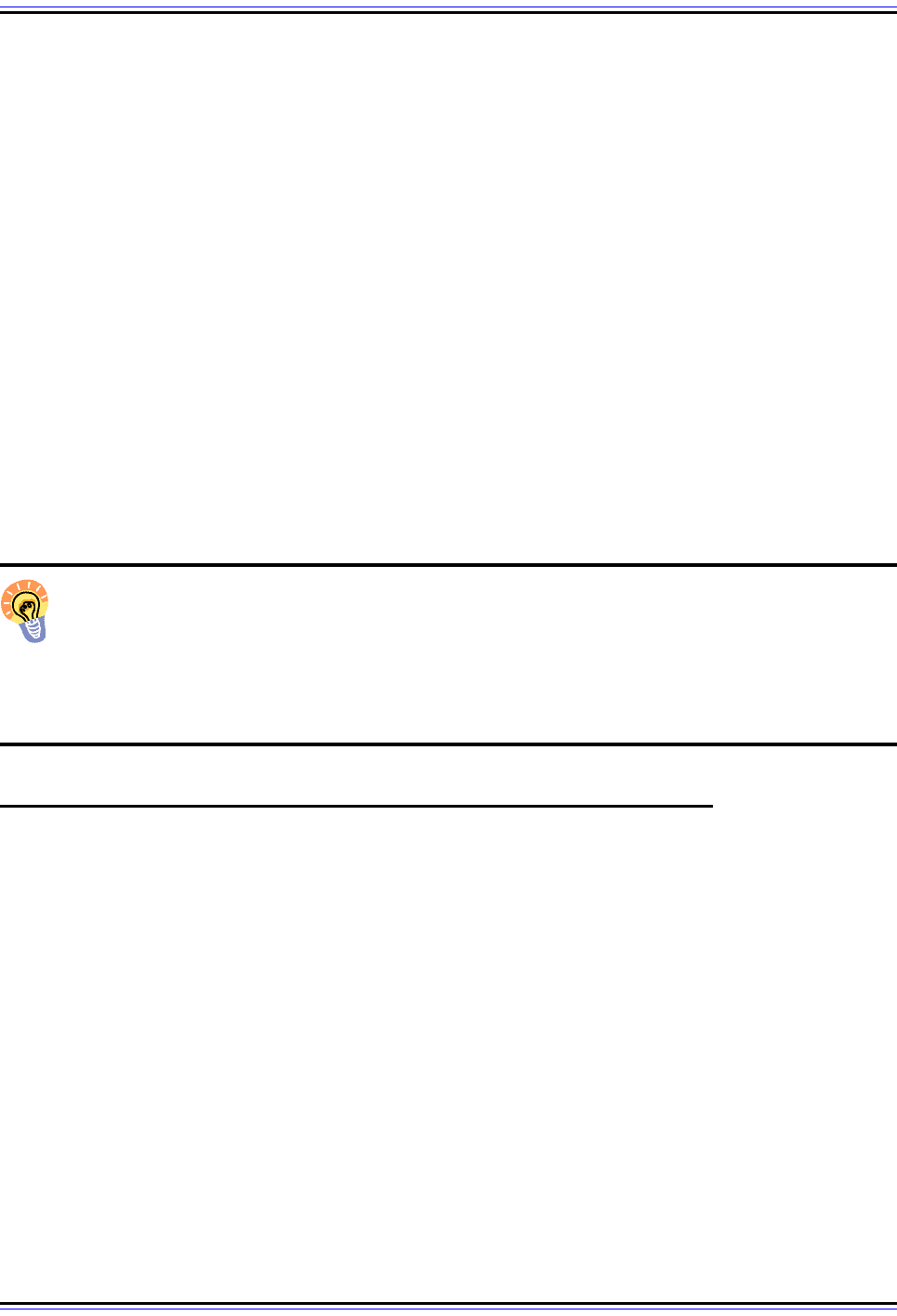
The TCP/IP Guide - Version 3.0 (Contents) ` 1146 _ © 2001-2005 Charles M. Kozierok. All Rights Reserved.
☯ Message Retransmission: Since DHCP uses the unreliable User Datagram Protocol
for messaging, clients are responsible for detecting message loss and retransmitting
requests if need be.
DHCP Device Roles and Interaction
The DHCP server and client obviously play complementary roles. The server maintains
configuration parameters for all clients; each client maintains its own parameters, as
discussed in the next topic. IP address assignment and lease creation, renewal, rebinding
and termination are accomplished through specific exchanges using a set of eight DHCP
message types, which we will see later in this section. To accomplish this messaging,
special rules are followed to generate, address and transport messages, which are
explained in a topic in the section on DHCP messaging.
Like BOOTP, DHCP also supports a third type of device, the relay agent. Relay agents are
neither clients nor servers, but rather intermediaries that facilitate cross-network communi-
cation between servers and clients. They are described in more detail in the section on
DHCP implementation and features (where you can also find more of the implementation
details of servers and clients.)
Key Concept: DHCP servers are devices programmed to provide DHCP services to
clients. They manage address information and other parameters and respond to
client configuration requests. DHCP clients are TCP/IP devices that have been set to
use DHCP to determine their configuration. They send requests and read responses, and
are responsible for managing their own leases, including renewing or rebinding a lease
when necessary.
DHCP Configuration Parameters, Storage and Communication
One of the more important oversights in DHCP's predecessor, BOOTP, is that the original
protocol allowed a server to tell a client only three pieces of information: its IP address, the
name of the server it could use to download a boot file, and the name of the boot file to use.
This was a result of BOOTP's legacy as a protocol created primarily to let diskless worksta-
tions be bootstrapped.
Obviously, the IP address is a very important parameter, but in modern networks it isn't the
only one that a client needs to be given for it to function properly. A typical host needs to be
given other essential information to allow it to know how it should operate on its local
network and interact with other devices. For example, it needs to know the address of a
default local router, the subnet mask for the subnet it is on, parameters for creating outgoing
IP datagrams, and much more.

The TCP/IP Guide - Version 3.0 (Contents) ` 1147 _ © 2001-2005 Charles M. Kozierok. All Rights Reserved.
Configuration Parameter Management
The inability to specify additional configuration parameters in BOOTP was resolved by
using the special BOOTP Vendor-Specific Area for vendor-independent vendor information
fields, as first defined in RFC 1048. In DHCP, this idea has been extended further, and more
important, formalized, as part of the effort to make DHCP a more general-purpose configu-
ration tool. Configuration parameter storage, maintenance and communication is no longer
an optional feature, but an essential part of the host configuration process.
Just as DHCP servers are the “bosses” that own and manage IP addresses, they also act
as the repository for other configuration parameters that belong to DHCP clients. This
centralization of parameter storage provides many of the same benefits that centralizing IP
addresses in DHCP does: parameters can be checked and adjusted in a single place rather
than having to go to each client machine.
Each DHCP server is programmed with parameters that are to be communicated to clients
in addition to an IP address when an address is assigned. Alternately, a client that has
already been assigned an address using some other mechanism may still query the DHCP
server to get parameter information, using the DHCPINFORM message type. (This was
actually added to the protocol in RFC 2131; it was not in the original DHCP standard.)
The exact method of storage of client parameters is to some extent implementation-
dependent. Typically, there will be some parameters that apply to all clients. For example,
on a small network with only one router, that router will probably be the default router for
every DHCP client regardless of address.
Client-Specific Parameters and Client Identifiers
The DHCP server will also have certain parameters that are client-specific; the IP address
itself is an obvious example, but there are other parameters that may apply to only certain
clients on a network. These parameters are stored in some sort of a database, and indexed
using a particular client identifier.
The default identifier consists of the client's IP subnet number and its hardware address.
Thus, when a server gets a request from a particular subnet it can use the client's hardware
address in the request to look up client-specific parameters and return them. The client
identifier can be changed if a different identification scheme is desired.
Client Parameter Storage
Clients are also responsible for parameter storage, but of course, only their own param-
eters. Many of these will be obtained from the DHCP server, though some may be supplied
in other ways. The specific implementation of the client determines which parameters it
considers important and how they are discovered.

The TCP/IP Guide - Version 3.0 (Contents) ` 1148 _ © 2001-2005 Charles M. Kozierok. All Rights Reserved.
Configuration Parameter Communication
Communication of configuration parameters between DHCP clients and servers is accom-
plished using DHCP options, which replace BOOTP vendor information fields. A number of
options were defined when DHCP was first created, and additional new ones have been
created over the years. There are today several dozen of these options. Obviously, the
ability to have so many different parameters automatically delivered to a client provides a
great deal of host configuration flexibility to administrators. DHCP options are described
further in the section on DHCP message formats.
DHCP General Operation and Client Finite State Machine
Dynamic address allocation is probably the most important new capability introduced by
DHCP. In the last section I discussed in detail the significance of the change from IP
address ownership to IP address leasing. I also provided a high-level look of the activities
involved in leasing, by providing an overview of the DHCP lease “life cycle”.
An overview of this sort is useful to get a general handle on how leases work, but to really
understand the mechanics of DHCP address assignment and client/server communication,
we need more detail on how the devices behave and what messages they send. One tool
often employed by networking engineers to describe a protocol is a theoretical model called
a finite state machine (FSM). In this technique, the protocol's specific behavior is illustrated
by showing the different states a device can be in, what possible transitions exist from one
state to another, what events cause transitions to occur, and what actions are performed in
response to an event. The TCP operational overview contains more general background
information on finite state machines.
The DHCP standard uses an FSM to describe the lease life cycle from the perspective of a
DHCP client. The client begins in an initial INIT state where it has no lease, and then transi-
tions through various states as it acquires, renews, rebinds and/or releases its IP address.
The FSM also indicates what message exchanges occurs between the server and client at
various stages.
Some people think finite state machines are a little “dense” and hard to understand, and I
can see why. You can skip this topic of course, but I think the FSM provides a useful way of
illustrating in a comprehensive way most of the behavior of a DHCP client. Table 189
describes each of the DHCP client states, and summarizes the messages sent and
received by the client in each, as well as showing the state transitions that occur in

The TCP/IP Guide - Version 3.0 (Contents) ` 1149 _ © 2001-2005 Charles M. Kozierok. All Rights Reserved.
response. The FSM’s states, events and transitions are easier to envision in Figure 262,
which also incorporates a color coding scheme so you can see which states are associated
with each of the main DHCP processes.
Table 189: DHCP Client Finite State Machine (Page 1 of 3)
State State Description Event and Transition
INIT
This is the initialization
state, where a client
begins the process of
acquiring a lease. It also
returns here when a lease
ends, or when a lease
negotiation fails.
Client Sends DHCPDISCOVER: The client creates a
DHCPDISCOVER message and broadcasts it to try to find a
DHCP server. It transitions to the SELECTING state.
SELECTING
The client is waiting to
receive DHCPOFFER
messages from one or
more DHCP servers, so it
can choose one.
Client Receives Offers, Selects Preferred Offer, Sends
DHCPREQUEST: The client chooses one of the offers it has
been sent, and broadcasts a DHCPREQUEST message to
tell DHCP servers what its choice was. It transitions to the
REQUESTING state.
REQUESTING
The client is waiting to
hear back from the server
to which it sent its request.
Client Receives DHCPACK, Successfully Checks That IP
Address Is Free: The client receives a DHCPACK message
from its chosen server, confirming that it can have the lease
that was offered. It checks to ensure that address is not
already used, and assuming it is not, records the parameters
the server sent it, sets the lease timers T1 and T2, and
transitions to the BOUND state.
Client Receives DHCPACK, But IP Address Is In Use: The
client receives a DHCPACK message from its chosen server,
confirming that it can have the lease that was offered.
However, it checks and finds the address already in use. It
sends a DHCPDECLINE message back to the server, and
returns to the INIT state.
Client Receives DHCPNAK: The client receives a
DHCPNAK message from its chosen server, which means
the server has withdrawn its offer. The client returns to the
INIT state.
INIT-REBOOT
When a client that already
has a valid lease starts up
after a power-down or
reboot, it starts here
instead of the INIT state.
Client Sends DHCPREQUEST: The client sends a
DHCPREQUEST message to attempt to verify its lease and
re-obtain its configuration parameters. It then transitions to
the REBOOTING state to wait for a response.

The TCP/IP Guide - Version 3.0 (Contents) ` 1150 _ © 2001-2005 Charles M. Kozierok. All Rights Reserved.
REBOOTING
A client that has rebooted
with an assigned address
is waiting for a confirming
reply from a server.
Client Receives DHCPACK, Successfully Checks That IP
Address Is Free: The client receives a DHCPACK message
from the server that has its lease information, confirming that
the lease is still valid. To be safe, the client checks anyway to
ensure that the address is not already in use by some other
device. Assuming it is not, the client records the parameters
the server sent it and transitions to the BOUND state.
Client Receives DHCPACK, But IP Address Is In Use: The
client receives a DHCPACK message from the server that
had its lease, confirming that the lease is still valid. However,
the client checks and finds that while the client was offline,
some other device has grabbed its leased IP address. The
client sends a DHCPDECLINE message back to the server,
and returns to the INIT state to obtain a new lease.
Client Receives DHCPNAK: The client receives a
DHCPNAK message from a server. This tells it that its
current lease is no longer valid; for example, the client may
have moved to a new network where it can no longer use the
address in its present lease. The client returns to the INIT
state.
BOUND
Client has a valid lease
and is in its normal
operating state.
Renewal Timer (T1) Expires: The client transitions to the
RENEWING state.
Client Terminates Lease, Sends DHCPRELEASE: The
client decides to terminate the lease (due to user command,
for example.) It sends a DHCPRELEASE message and
returns to the INIT state.
RENEWING
Client is trying to renew its
lease. It regularly sends
DHCPREQUEST
messages with the server
that gave it its current
lease specified, and waits
for a reply.
Client Receives DHCPACK: The client receives a
DHCPACK reply to its DHCPREQUEST. Its lease is
renewed, it restarts the T1 and T2 timers, and returns to the
BOUND state.
Client Receives DHCPNAK: The server has refused to
renew the client's lease. The client goes to the INIT state to
get a new lease.
Rebinding Timer (T2) Expires: While attempting to renew
its lease, the T2 timer expires, indicating that the renewal
period has ended. The client transitions to the REBINDING
state.
Table 189: DHCP Client Finite State Machine (Page 2 of 3)
State State Description Event and Transition
